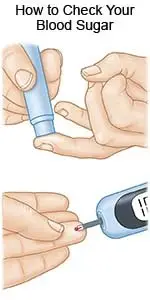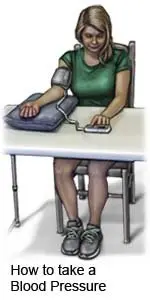What is diabetic kidney disease (DKD)?
DKD is the gradual and permanent loss of kidney function. This occurs because of kidney damage caused by high blood sugar levels. Normally, the kidneys remove fluid, chemicals, and waste from your blood. These wastes are turned into urine by your kidneys. When you have DKD, your kidneys do not function properly.
What are the signs and symptoms of DKD?
Your signs and symptoms will depend on how well your kidneys work. You may have any of the following:
- Changes in how often you need to urinate
- Ankle and leg swelling
- Fatigue or weakness
- Itching
- Muscle cramps
- Nausea, vomiting, or loss of appetite
How is DKD diagnosed?
Blood and urine tests will show how well your kidneys are working. A biopsy may be done to make sure there are no other causes of your kidney disease. A biopsy is a procedure to remove and test a small piece of tissue from your kidney.
How is DKD treated?
The goals of treatment are to control your symptoms and prevent your DKD from getting worse. You may need any of the following:
- Medicines may be given to lower your blood sugar level. Medicines may also be given to lower your blood pressure or get rid of extra fluid. Blood pressure medicines can help slow the loss of kidney function.
- Dialysis is a treatment that may be needed to remove chemicals and waste from your blood when your kidneys can no longer do this.
- Surgery may be needed to create an arteriovenous fistula (AVF) in your arm or insert a catheter into your abdomen or chest. This is done so you can receive dialysis.
- A kidney transplant may be done if your DKD becomes severe.
Treatment options
The following list of medications are in some way related to or used in the treatment of this condition.
- lisinopril
- Cozaar
- losartan
- Altace
- Avapro
View more treatment options
What can I do to manage DKD?
- Follow up with your diabetes care team provider as directed. You may need to return for tests up to 4 times each year to monitor your kidney function. You may also be referred to a kidney specialist.
- Control your blood sugar level. Check your blood sugar level every day, as often as your care team provider has recommended. Your provider may want you to have your A1c checked every 3 to 6 months. Most people should keep their A1c at or below 7%.

- Follow your meal plan as directed. You may need to eat only a certain amount of protein at each meal. You may also need to track your sodium (salt) and potassium intake. Work with your dietitian to develop a meal plan that is right for you.
- Check your blood pressure as directed. High blood pressure can damage the blood vessels in your kidneys. This prevents your kidneys from working correctly and increases your risk for DKD. A normal blood pressure is 119/79 or lower. Talk to your healthcare provider about your blood pressure goals. Together you can create a plan to lower your blood pressure if needed and keep it in a healthy range. The plan may include lifestyle changes or medicines to lower your blood pressure.

- Talk to your care team provider about over-the-counter (OTC) medicines you should avoid. Some OTC medicines, such as ibuprofen, can damage your kidneys.
Call your local emergency number (911 in the US) or have someone call if:
- You have a seizure.
- You have sudden chest pain or shortness of breath.
When should I seek immediate care?
- Your heart is beating faster than normal for you.
- You are confused and very drowsy.
When should I call my diabetes care team provider?
- You suddenly gain or lose more weight than your care team provider has told you is okay.
- You have itchy skin or a rash.
- You have nausea and repeated vomiting.
- You have fatigue or muscle weakness.
- You have an increased need to urinate, burning or pain when you urinate, blood in your urine, or strong odor to your urine.
- You have questions or concerns about your condition or care.
Care Agreement
You have the right to help plan your care. Learn about your health condition and how it may be treated. Discuss treatment options with your healthcare providers to decide what care you want to receive. You always have the right to refuse treatment. The above information is an educational aid only. It is not intended as medical advice for individual conditions or treatments. Talk to your doctor, nurse or pharmacist before following any medical regimen to see if it is safe and effective for you.© Copyright Merative 2023 Information is for End User's use only and may not be sold, redistributed or otherwise used for commercial purposes.




